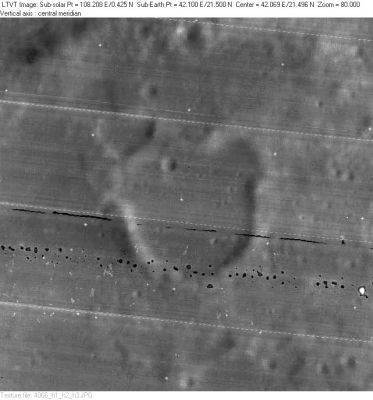Esclangon
Contents
Esclangon
(formerly Macrobius L)
|
Lat: 21.5°N, Long: 42.1°E, Diam: 15 km, Depth: 0.59 km, Rükl: 25 |
Images
LPOD Photo Gallery Lunar Orbiter Images Apollo Images
- Detailed close-ups of Esclangon were made during the mission of Apollo 17, on orbital panoramic ITEK camera frames AS17-P-2279 and AS17-P-2284. Scroll to the right, beyond both of the frames's centres, to see Esclangon and the many craterlets on its floor.
- The weird shape of Esclangon was also captured in the very centre of Apollo 17's northward looking mapping/metric Fairchild camera frame AS15-M-0931.
- Apollo 15's AS15-M-0384 shows a vertical view of Esclangon.
- Apollo 17's orbital color Hasselblad camera photograph of Esclangon: AS17-153-23470.
- Research orbital Apollo photography: Danny Caes
Maps
(LAC zone 43C1) LAC map Geologic map LTO map
Description
Description: Wikipedia
Additional Information
Depth data from Kurt Fisher database
- Westfall, 2000: 0.59 km
A much larger unnamed crater surrounding Esclangon?
So it looks on SLC chart B3 (Macrobius L).
Nomenclature
- Named for Ernest Benjamin Esclangon (1876-1954), a French astronomer who served as a director of the Strasbourg and Paris Observatories and of the International Time Bureau.
- This replacement name for a formerly lettered crater first appeared on LTO-43C1 (May 1974). It was approved in IAU Transactions XVIB (1976). - Jim Mosher
LPOD Articles
Bibliography
Esclangon is mentioned in the footnotes on page 229 of T.W.Webb's Celestial Objects for Common Telescopes (Volume 1: The Solar System), in the chapter COMETS, because he (Esclangon) once observed the occultation of a 10.5 magnitude star by comet Brooks (1911C.). - DannyCaes Jul 3, 2015
